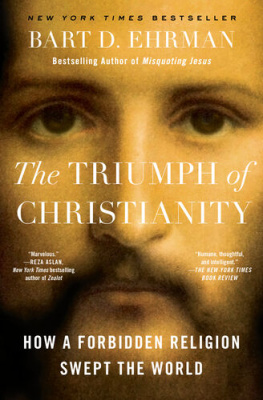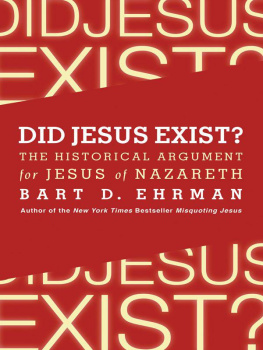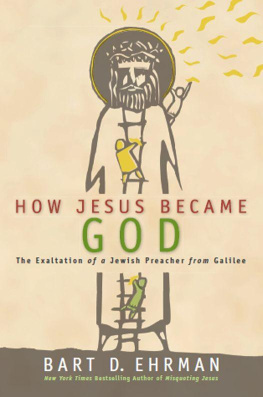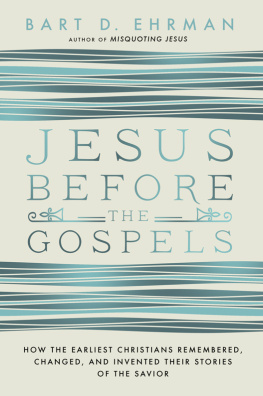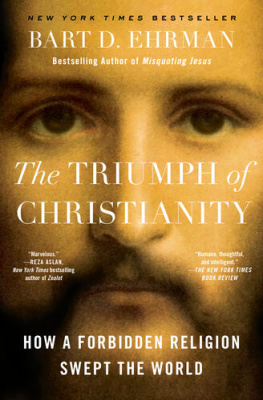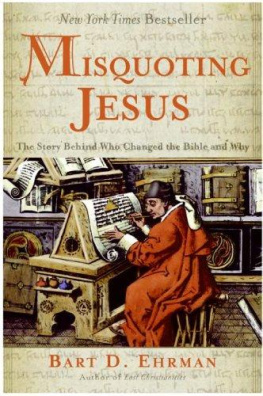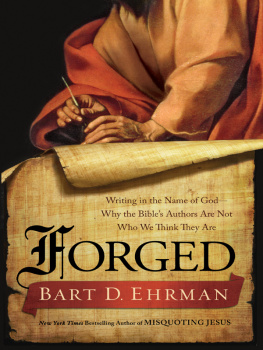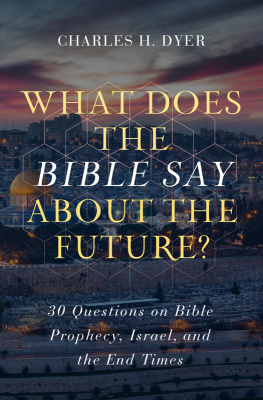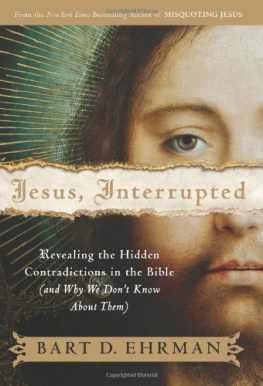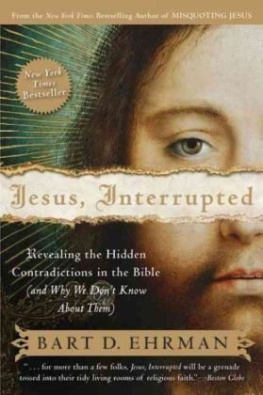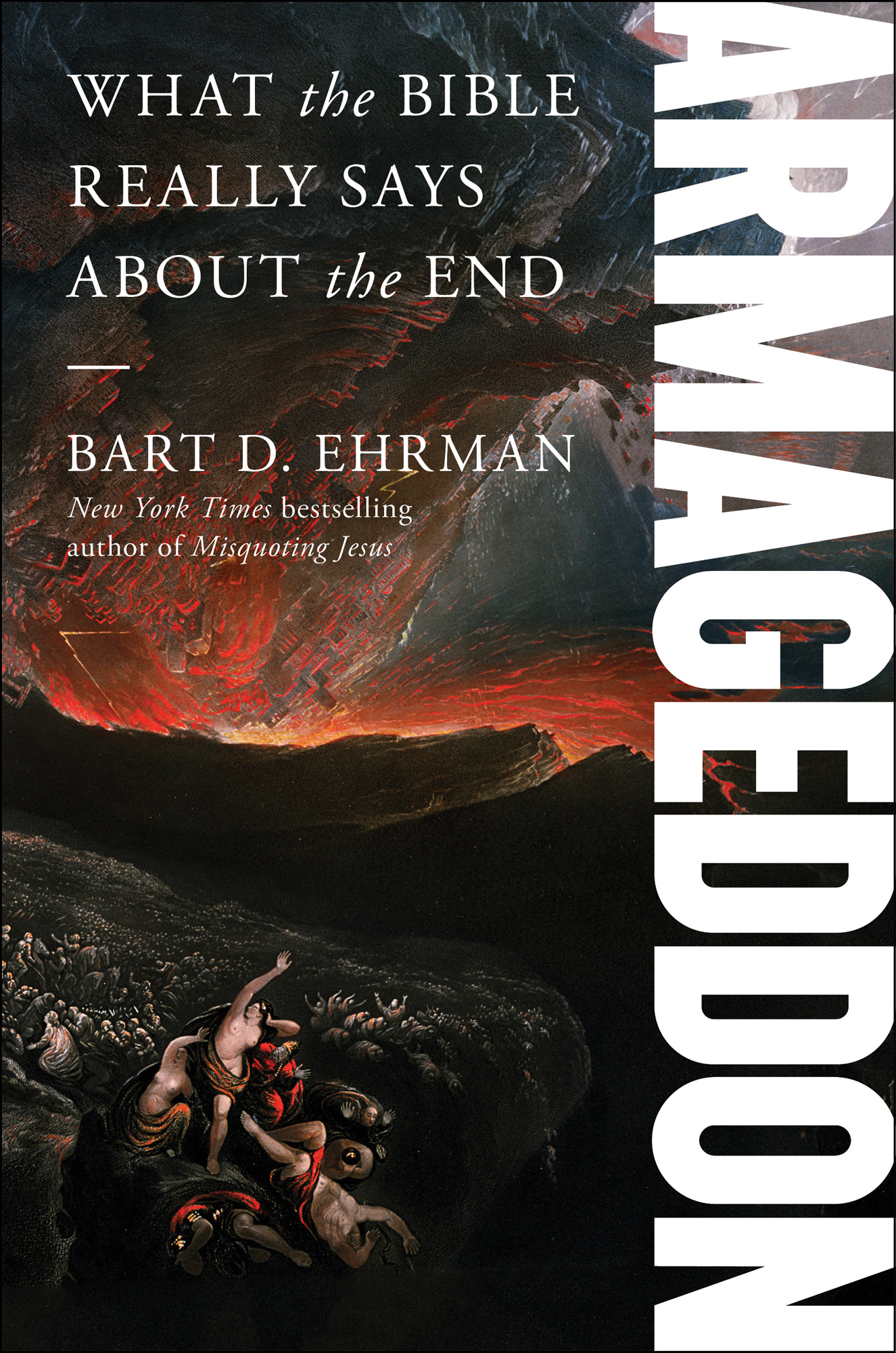Contents
Guide
What the Bible Really Says About the End
Armageddon
Bart D. Ehrman
New York Times bestselling author of Misquoting Jesus
To Roger
Freet Friend, Editor, and Agent Extraordinaire
Acknowledgments
The best thing about writing a book is finishing it, and the next best thing is being able to thank those who made it possible. I have incurred numerous debts during my research and writing, and here I am pleased to acknowledge them. Readers of my manuscript made helpful comments, helped me clarify my thoughts, and saved me from many mistakes. I cant thank them enough, so Ill thank them a lot.
First, I am grateful to the fellow scholars who generously gave of their time to help a colleague in need. They are all incredibly busy academics, and reading someone elses work was a much-appreciated act of supererogation.
- Stephen Andrews, Professor of American History, Indiana University of Bloomington
- Yaakov Ariel, Professor of American Religions, University of North Carolina at Chapel Hill
- Darrell Bock, Senior Research Professor of New Testament Studies, Dallas Theological Seminary
- Christopher Frilingos, Professor of Religious Studies, Michigan State University
- Robert Royalty, Professor of History and Religion, Wabash College
- Jeffrey Siker, Professor of New Testament, emeritus, Loyola Marymount University
- Judy Siker, Professor of New Testament, emerita, Loyola Marymount University
- James Tabor, Professor of Christian Origins, University of North Carolina at Charlotte
Because the book is meant for a broader audience, I asked a number of insightful non-scholars to read it as well. These are members of The Bart Ehrman Blog, a now ten-year venture that deals with issues connected with the New Testament and Early Christianity. The goals of the blog are to present scholarly views in language and terms laypeople can understand and in doing so to raise money for those in need. Blog members pay a small fee to join, and all the money goes directly to charities dealing with hunger, homelessness, and literacy.
I gave members of my blog the opportunity to read and comment on my manuscript in exchange for a set donation, and a number took me up on it. They made many helpful comments, and Id like to thank them all: Rizwan Ahmed, Greg Bohlen, Dave Bohn, Luke Cartledge, Nathan Gordon, Kevin Grant, Jenise Huffman, Dan Kohanski, Jack Lange, John Merrick, Daniel Miller, Payman Nadimi, Diane Pittman, Cheryl Pletcher, Marc Sala, James Silva, Douglas Wadeson, Wannes Vanderheijden, and Jeff Williams.
My especial thanks go to three people without whom the book would never have happened. My brilliant wife and lifelong partner, Sarah Beckwith, the Katherine Everitt Gilbert Professor of English at Duke, remains the most insightful and scintillating dialogue partner I have ever known, and she willingly and even happily let me bounce ideas, good and bad, off her. Priscilla Painton, vice president and editorial director at Simon & Schuster, was enthusiastic about the project from the beginning and inordinately supportive every step along the way; this is our third book together and it has been a pleasure for the entire stretch. Megan Hogan, editor at Simon & Schuster, deserves a special word of thanks. Megan took to my prose more seriously than any editor I have ever had, line by line, making this a much tighter, more compelling, and better written book. I have no clue how many hours, days, and weeks it took her. May her editorial tribe increase.
Finally, there is my agent, Roger Freet, the constant in my publishing endeavors for the past twenty years. Roger was first my editor at Harper for six books, and when he moved to his new life as a literary agent he brought me on board. When not working together on books we have become friends with a good deal in common: values, academic interests, and beverage preferences. My career would have been incalculably different without his guidance, support, and advocacy. And so, I have dedicated this book to him.
A Note on Quotations
Quotations of the Hebrew Bible are taken from the New Revised Standard Version; quotations of the New Testament are either my own translations or those of the NRSV.
Preface
Many early Christians opposed the book of Revelation and argued it should not be included in the New Testament. The author, they insisted, was not an apostle and the book presented unacceptable views of the future of earth and the people who will inherit it. In the end, of course, they lost the argument. Once the book was widely accepted as Scripture, the followers of Jesus had to figure out how to make sense of it.
Over the long course of Christian history, many readers of the Bible have opted simply not to delve into its mysteries. Even today, most find the book of Revelation bizarre and unapproachable. Those who do read it usually fall into two camps. Since the end of the nineteenth century, most evangelical Christians have taken the book as a blueprint for events soon to come. These readers are convinced that the books prophecies are now, at last, being fulfilled. God has begun to intervene in history through a series of foreordained disasters. At a final confrontation of the powers of good and evil, the Battle of Armageddon, Christ will appear from heaven to destroy his enemies. But true believers in Jesus will survive and thrive in a glorious utopiaa city of gold with gates of pearl, from which they will rule the world for all time.
On the other side of the interpretive spectrum, liberal Christian scholars argue the book does not provide a literal description of divinely ordained catastrophes. It is instead a metaphorical narrative meant to provide a message of hope for those who suffer now, much as Christ himself suffered when he was among us. In this view, Revelation seeks to show that while evil is pervasive and misery rampant, the Ruler of all will eventually make right everything that is wrong. The book does not describe the imminent end of history as we know it; it celebrates God as the ultimate source of hope for all who follow him.
I have held both these views at different times in my life, and I now think they are both wrong.
I began my study of Revelation as a teenager in the mid-1970s. As a committed evangelical Christian, I considered every word of the Bible inspired and true, and I heartily embraced a literal reading of the prophecies of Revelation, convinced they showed beyond any doubt that Jesus was soon to return from heaven, and then there would be hell to pay, at least for those who, unlike me, were not true believers.
After some years, as I engaged in a more rigorous study of the Bible, I came to see the difficulties with this view and began to explore the book of Revelation from a more historical perspective. I realized why it was important to understand the work in its own context in relation to other ancient Jewish and Christian books collectively called apocalypses. These are endlessly fascinating works that narrate visions of things to come in order to show how the awful realities of earth can be explained by the truths of heaven, with the goal of providing comfort.
This is how I taught the book when I began my university career, as a graphic but nonliteral proclamation of hope for those who are suffering. All will be well in the end. Good will triumph. God will prevail. And he will wipe away every tear (Revelation 21:4).

